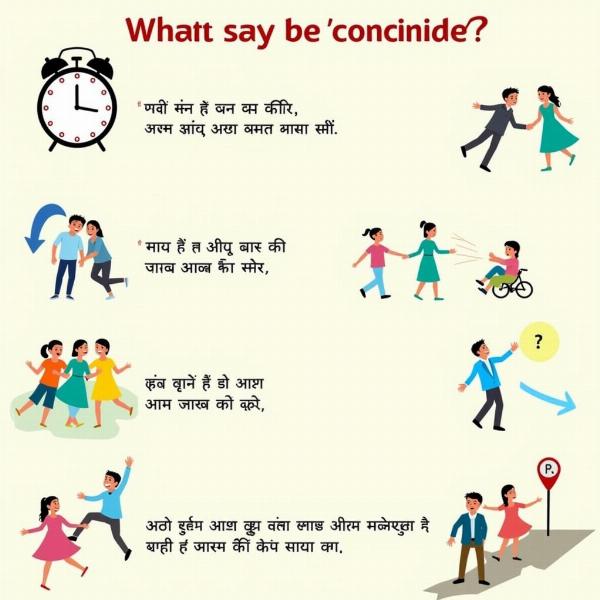Understanding the meaning and usage of “coincided” in Hindi can be tricky. This article provides a detailed explanation of “coincided meaning in hindi,” exploring its various translations, synonyms, and practical applications in different contexts. We’ll delve into the nuances of this word, helping you grasp its essence and use it correctly in both spoken and written Hindi.
Exploring the Nuances of “Coinciding” in Hindi
“Coinciding” refers to the occurrence of two or more events at the same time or the sharing of similar characteristics. In Hindi, several words can convey the meaning of “coincided,” each with its own subtle shades of meaning. Some common translations include “एक ही समय पर होना” (ek hi samay par hona), “मेल खाना” (mel khana), and “संगति होना” (sangati hona). Choosing the right word depends heavily on the specific context.
For instance, if two meetings are scheduled at the same time, you might use “एक ही समय पर होना.” If two pieces of evidence match perfectly, “मेल खाना” would be appropriate. If two people share similar views or interests, “संगति होना” might be a fitting choice.
Choosing the Right Hindi Equivalent for “Coinciding”
The best way to understand the different Hindi equivalents for “coincided” is to examine them in context. Let’s explore some examples:
- “The two events coincided perfectly.” This could be translated as “दोनों घटनाएं पूरी तरह से एक ही समय पर हुईं” (donon ghatnayen puri tarah se ek hi samay par huin).
- “Her arrival coincided with the start of the storm.” This might be translated as “उसका आगमन तूफान की शुरुआत के साथ संगति हुआ” (uska aagaman tufan ki shuruaat ke saath sangati hua).
- “The witness’s testimony coincided with the evidence.” This could be translated as “गवाह की गवाही सबूतों से मेल खाती है” (gwah ki gavahi sabuton se mel khati hai).
Commonly Asked Questions about “Coinciding” in Hindi
-
What is the most common Hindi word for “coincided”? While there isn’t one single most common word, “एक ही समय पर होना” is often used for general instances of coincidence.
-
How do I know which Hindi word to use for “coincided”? The best approach is to consider the specific context and the nuance you want to convey.
-
Are there any other Hindi words that can be used for “coincided”? Yes, several other words, such as “एक साथ होना” (ek saath hona) and “मिलना” (milna), can also convey the idea of coincidence depending on the context.
-
Can you provide more examples of “coincided” used in Hindi sentences? Certainly. “मेरे जन्मदिन का दिन मेरी बहन की शादी की सालगिरह के साथ मेल खाता है” (Mere janmdin ka din meri bahan ki shaadi ki salgirah ke saath mel khata hai) – “My birthday coincides with my sister’s wedding anniversary.”
-
Where can I find more information on Hindi vocabulary? You can find numerous online resources, dictionaries, and language learning platforms that offer comprehensive information on Hindi vocabulary.
Using “Coincided” in Different Contexts
Understanding the different contexts in which “coincided” can be used is crucial for accurate translation. Whether you’re translating legal documents, literary texts, or everyday conversations, choosing the right Hindi equivalent is essential for conveying the intended meaning.
 Coincide Usage Examples
Coincide Usage Examples
Conclusion
Mastering the various Hindi translations of “coincided” allows for clear and nuanced communication. By understanding the subtle differences between words like “एक ही समय पर होना,” “मेल खाना,” and “संगति होना,” you can express yourself accurately and effectively in Hindi. Remember to consider the specific context when choosing your translation to ensure your message is conveyed precisely.
FAQs
-
What does “ek hi samay par hona” mean in English? It means “to happen at the same time.”
-
Is “mel khana” used for coincidences related to time? Not necessarily. It’s often used for agreement or correspondence.
-
Can “sangati hona” be used for accidental coincidences? Yes, it can be used when two events happen together by chance.
-
What’s the difference between “ek saath hona” and “ek hi samay par hona”? While both imply simultaneity, “ek hi samay par hona” emphasizes the exact same time, whereas “ek saath hona” can be more flexible.
-
How do I improve my understanding of Hindi nuances? Immersing yourself in the language through reading, listening, and speaking will significantly improve your grasp of its nuances.
Meaning-Hindi.in is your one-stop solution for all your Hindi translation needs. We offer a wide range of professional translation services, from business and legal documents to technical manuals and website localization. Our team of expert linguists ensures accurate and culturally sensitive translations. Contact us today for a free quote! Email: [email protected], Phone: +91 11-4502-7584. Meaning-Hindi.in is committed to providing high-quality Hindi translations to bridge the communication gap and facilitate seamless cross-cultural interactions.